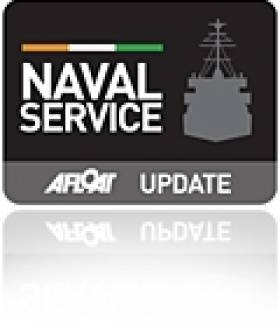Displaying items by tag: New Chief of Staff
New Chief of Staff Appointed to Defence Forces
#NewChiefofStaff - Vice Admiral Mark Mellett DSM* will formally be appointed the new Chief of staff of the Defence Forces, from midnight tonight, having previously been proposed by the Minister for Defence Mr Simon Coveney TD and accepted by the Irish Government on the 30th of June. He will succeed the current Chief of Staff Lieutenant General Conor O’Boyle DSM and is the first Irish Naval Service Officer to hold the honour.
Speaking on his new role VADM Mellett DSM said; "It is humbling to be Chief of Staff of Óglaigh na hÉireann, particularly in this landmark time for Ireland and the Irish people. I would like to thank my predecessor Lieutenant General Conor O'Boyle DSM for the direction and guidance he has brought to the Defence Forces and his mentoring to me over his tenure. I look forward to the continuance of this work through the pursuit of the goals laid out in the White Paper over the coming period."
Vice Admiral Mark Mellett DSM, PhD
VADM Mark Mellett DSM is the Chief of Staff of Óglaigh na hÉireann, the Irish Defence Forces, having been promoted to the appointment by the Irish Government on the 29th of September 2015.
Prior to his current position, VADM Mellett was the Deputy Chief of Staff of the Irish Defence Forces where he had responsibility for materiel and support functions, including personnel, finance and logistics in the Army, Air Corps and Naval Service. He has thirty eight years service, much of it seagoing, including three naval commands.
VADM Mellett previously served as Flag Officer Commanding the Irish Naval Service. During shore rotations he held appointments in Naval Headquarters, Naval Operations and Support Commands. for over two decades he has been a change leader in the Irish Defence Forces, contributing to it's ongoing transformation, positioning the forces in a post-modern setting.
He has served as Head of Naval Plans and Policy, Commandant of the Naval College and Associate Head of the National Maritime College of Ireland (NMCI.)
*In addition to citations for service in Afghanistan (2004) and Lebanon (1989) in 1994 VADM Mellett was decorated by the Irish State, receiving "The Distinguished Service Medal (DSM)" for intercepting a major maritime narcotics shipment.
VADM Mellett is a founding member of the Irish Maritime and Energy resource Cluster (IMERC) and a member of it's governing authority. IMERC serves as an 'Innovation Network,' and acts as a stimulant for enterprise and job creation in the maritime and renewable energy spheres. It has a particular focus on marine energy, shipping logistics and transport, maritime security and safety and yachting products and services.
VADM Mellett has a PhD (2009) in Political Science from the National University of Ireland, Galway and an M Com (2004) in Government and Public Policy from University College Cork. He has been a Visiting Professor at Liverpool Hope University (UK.) He is a distinguished graduate of the US Naval War College, Newport RI (1999); the Irish Command and Staff College (1998) and the Royal Naval College Greenwich (1989.)
VADM Mellett has a keen interest in research and has been a member of the European Security research Innovation Forum (ESRIF.) He has published on innovation, security, governance and maritime affairs.
He is a former naval diver and enjoys running, cycling and fitness. He is married to Liz and has four children.
Nomination for New Defence Forces Chief of Staff
#NewChiefOFstaff - Rear Admiral Mark Mellett DSM writes The Irish Times has been nominated by Minister for Defence Simon Coveney for the appointment by the President as chief of staff of the Defence Forces.
Rear Admiral Mellett was appointed to the position of deputy chief of staff of the Defence Forces in November 2013.
From Co Mayo, he joined the Naval Service in 1976. His first command was the LÉ Orla in 1992, followed by the LÉ Ciara in 1997 and the flagship LÉ Eithne in 2005 (see related report today).
He will succeed the current chief of staff Lt Gen Conor O'Boyle when he retires in September this year.
Mr Coveney congratulated Rear Admiral Mellet on his new appointment and said that he is looking forward to working with him in the future.
Cork Institute of Technology (CIT) President Dr Brendan Murphy said - "We are delighted with to hear of the appointment of Rear Admiral Mark Mellett as Chief of Staff of the Irish Defence Forces. CIT, since the foundation of the National Maritime College of Ireland ten years ago, has had a long and fruitful relationship with the Irish Naval Service and in particular with Rear Admiral Mellett is his role as Officer Commanding the Irish Naval Service. It has been a long and fruitful relationship particularly as Mark showed great strategic vision. He has been instrumental in the transformation of the Irish Naval Service to a knowledge based institution and the naval service now actively takes part in education and research, playing an important role in the economic development of the country as a whole. I, and CIT, wish him every success in his new role."
Conor Mowlds, Head of the National Marine College of Ireland said " I would like to echo Dr Murphy's words and to give my very best wishes Rear Admiral Mellett. His appointment will add strength to the voice of the growing Irish Maritime Community."
For further details of the career of the Rear Admiral, click here.





























































